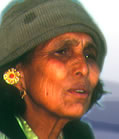THEMES IN THIS
TESTIMONY
Development

Education

Family Life

Festivals

Gender

Health

Migration

Click on arrows
to find more
testimonies
featuring
these themes
|
|
Sex
|
female
|
|
|
Age
|
28
|
|
|
Identity
|
Buddhist
|
|
|
Occupation
|
farmer
|
|
|
Location
|
Thakani VDC, Sindhupalchok
|
|
|
Date
|
1994
|
|
summary
During this interview the narrator gives a clear picture of gender inequalities in the area by sharing her own and other women’s experiences. She describes the day her future husband came to the field where she was working and "pulled her” - grabbed her for an arranged marriage. She says girls are now more aware of their rights, and "if someone forces them they are also able to protest". She herself agreed to a forced marriage because a respected grandfather told her to.
The central section of the interview gives a sense of the sheer scale of “girl-trafficking”. In the past, a girl would go missing every 10-12 days; they were kidnapped or persuaded "with flowery talk" to go to Bombay. But girls, and villagers in general, are now more aware (intervening and beating up attempted kidnappers), and no local girl has gone to Bombay in the past two years. Sometimes girls would go voluntarily to escape an unhappy arranged marriage. She believes one of the reasons the “trade” has declined is because more women are marrying by choice, so there are fewer unhappy marriages and fewer women running away. Those who return from Bombay face a tough time and are usually rejected by local villagers: “nobody will accept her … Everyone dislikes her”.
detailed breakdown
|
You will need a password from Panos to view the full
transcript of the interview. To apply for a password, click here.
Once you have a password, click here to go to the beginning
of the transcript. You can also click on any section of the
breakdown of content below and go straight to the
corresponding part of the transcript.
|
| Section 1-2 |
Has lived in current village for four years. Four sons aged 6-10, all in school. Though uneducated herself she realises value of education: “My parents didn't send me to school, but nowadays people have good work in the office because they are educated. That's why looking at them I also realised education is the most important thing. So I have sent my children to school.” Tries to persuade other villagers of value of education, though says local teachers are not good.
|
| Section 3-4 |
Family was "thrown out” of previous village (reason not given). Got "a little" compensation for land, not enough to allow them to settle in Kathmandu or the Terai. Attracted to current village because of AAN and prospect of employment with it. She did work with them for a couple of years.
Describes major festival (Loshar)... which involves no animal sacrifices (she's Buddhist). But they live among Tamangs and bring meat to celebrate Dashain. And "to adjust in the society, we go to maita (father’s home) and eat meat". Describes a dance at weddings which, she says, are "our major occasion”, for which people "spend a lot with great enthusiasm”.
|
| Section 5-6 |
Discusses how she was forced into an arranged marriage. Also describes the movement of girls to Bombay. Says women now choose husbands, which has helped slow the prostitution trafficking. Attributes greater awareness on these issues to AAN and adult education.
|
| Section 6-7 |
Relates story (prefaced by ominous: "If I talk, I will get into trouble”) of a shopkeeper who needed money, so sold his sister to a woman who sent her to Bombay. Same man later kidnapped a girl, raped and abused her at his home. The man's sister returned from Bombay after 10-12 days, but everybody hated her after she returned so soon with so little money to give them, and they refused to "eat her jutho" (leftovers). The woman is now married, though generally people don't like to marry Bombay returnees - unless they have come back wealthy.
|
| Section 8-9 |
Says a husband will persuade his wife he should take a second wife to get their hands on her money: “When they get all her money from her then they will neglect her.”
Subject shifts to lack of drinking water, medicines, vaccines or nearby hospital causing many deaths in the past. Children died at birth, or of diarrhoea or malnutrition.
|
|


